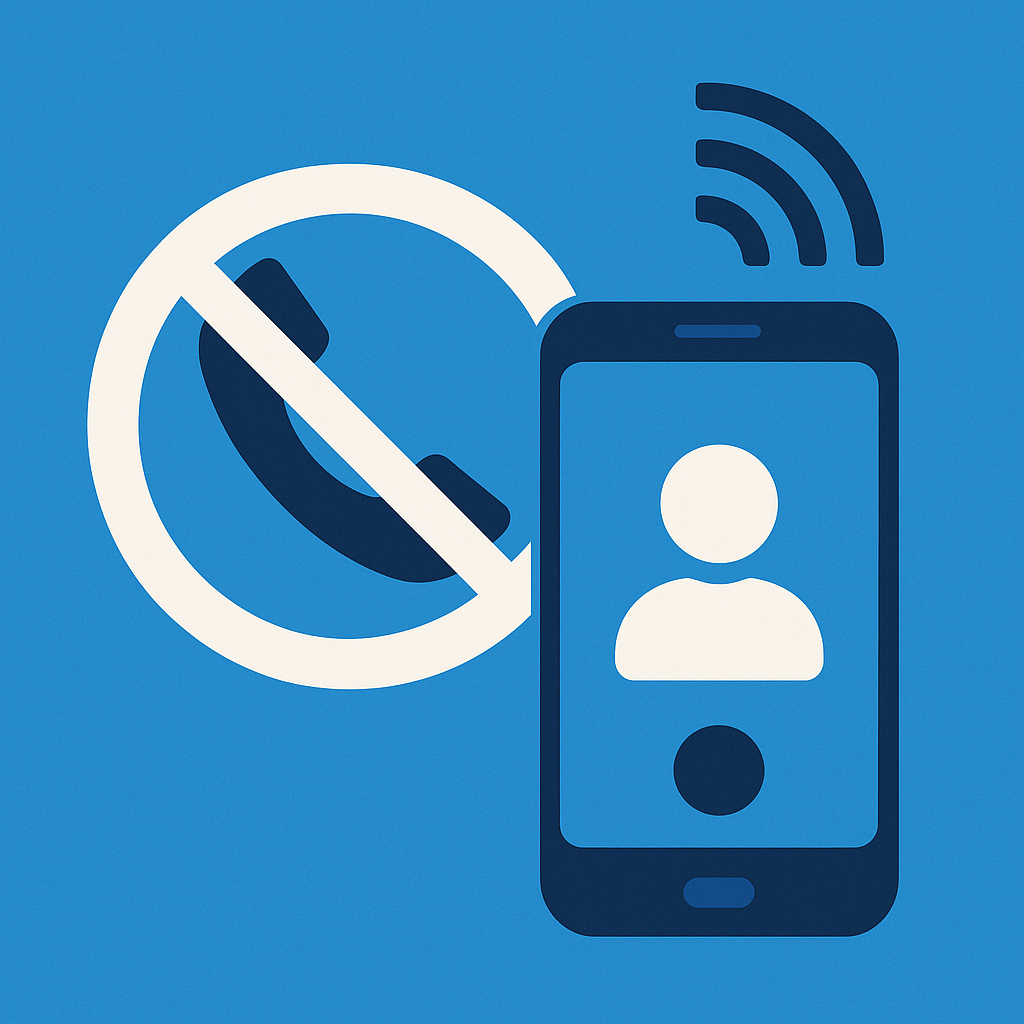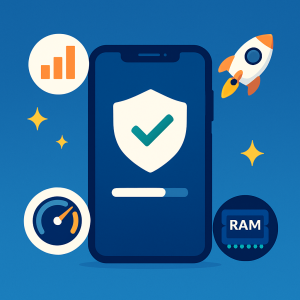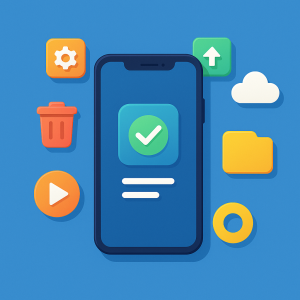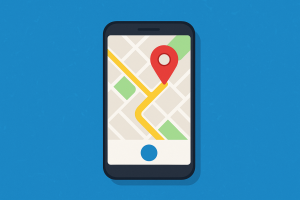Have you ever felt frustrated by constant calls from unknown numbers or spam messages that interrupt your day? This problem has become increasingly common, with the significant increase in telemarketing calls, phone scams, and unwanted messages. Fortunately, there are effective solutions to block unwanted numbers and regain peace of mind when using your smartphone. In this article, we’ll explore the best apps available to help you filter calls and messages, ensuring that only the truly important communications reach you.
With the advancement of technology, call blocking apps have evolved significantly in recent years, offering increasingly sophisticated features to identify and block suspicious numbers. In addition, many of these tools use artificial intelligence and collaborative databases to detect spam patterns and protect users more effectively.
Therefore, knowing the best options available on the market is essential for those looking for an effective solution to this daily nuisance. Let's take a detailed look at the four best apps for blocking unwanted numbers, their features, advantages and disadvantages, so you can choose the option that best suits your needs.
Why block unwanted numbers?
Before we dive into the solutions available, it’s important to understand the reasons why blocking unwanted numbers has become a necessity for many smartphone users. In fact, unwanted calls and messages aren’t just a momentary annoyance, but can have significant impacts on our daily lives and well-being.
Impact on productivity and concentration
First, telemarketing and spam calls take up valuable time. When you’re focused on work, relaxing, or spending time with your family, being interrupted by irrelevant calls can be incredibly frustrating. As a result, these constant interruptions take a toll on our productivity and ability to concentrate, creating a cycle of distraction that can be difficult to break.
Security and Privacy Risks
The issue of privacy is also fundamental in this context. With the increase in phone scams and phishing attempts, answering calls from unknown numbers can pose a risk to the security of your personal data. Criminals often use social engineering techniques to obtain sensitive information, such as passwords, bank details or documents. On the other hand, having a tool to block unknown calls acts as an additional layer of protection against these threats.
Psychological effects of constant interruptions
Another important aspect is the psychological impact. The stress caused by constant interruptions and the anxiety of seeing an unknown number calling repeatedly can negatively affect our mental health. In fact, many people report a sense of relief after implementing solutions to block unwanted numbers, regaining control over who can contact them.
Finally, it is worth noting that the problem has intensified in recent years. According to data from Anatel, Brazil records millions of complaints annually related to unwanted telemarketing calls. This reality makes the search for effective tools to filter these communications even more relevant. Therefore, using an app to block phone spam is not just a matter of convenience, but a necessity to protect our privacy, time and well-being.
Benefits of using call blocking apps
Implementing a caller ID app with call blocking features has several benefits that go beyond simply reducing interruptions. Understanding these benefits can help you further appreciate the importance of these tools in today’s environment.
Regaining control over communications
One of the main benefits is regaining control over your communication. When you use a number blocking app, you decide who can contact you and at what times. Many apps allow you to set specific times to block all calls except priority contacts, ensuring that your rest or concentration moments are not interrupted.
Significant time savings
Time savings are another significant factor. It’s estimated that the average person receives up to five unwanted phone calls per day, which amounts to over 30 minutes a week wasted on unnecessary interactions. By blocking telemarketing calls and other unwanted contacts, you can free up that time for more important or enjoyable activities.
Protection against fraud and scams
Fraud protection is also worth mentioning. Modern number blocking apps not only block calls, but also identify potential threats. In fact, many of them have constantly updated databases of numbers associated with known scams, alerting the user before they even answer the call. This way, the risk of falling for scams is significantly reduced.
Filtering unwanted SMS messages
Most SMS blocking apps also filter text messages, protecting you from phishing and spam via this communication channel. This feature is particularly important considering that many scams these days start with seemingly harmless messages that contain malicious links.
Reduce stress and anxiety
Reducing stress and anxiety is a benefit that users of these apps often report. Knowing that your phone will only ring when something really important brings a sense of peace that positively impacts your overall well-being. That’s why many people describe the experience of using a call blocking app as liberating.
Useful add-on features
Finally, it is worth mentioning that these apps often offer valuable additional features, such as identifying service callers (delivery, taxi, etc.), categorizing calls by type (telemarketing, search, etc.) and even transcribing voice messages. However, these additional features make the smartphone user experience more organized and efficient.
The 4 best apps to block numbers
After analyzing several apps available on the market, we selected the four best ones for blocking unwanted numbers, considering factors such as effectiveness, ease of use, additional features, and user reviews. Each of them has unique features that can meet different needs and preferences.
1. Truecaller – The most complete tool for blocking unwanted numbers
Truecaller stands out as one of the most popular and efficient apps for blocking unwanted numbers, with over 300 million active users worldwide. Its community-based approach creates a powerful crowdsourced database that identifies and categorizes unknown callers with impressive accuracy.
Main features and functionalities
- Advanced Caller ID and SMS
- Automatic blocking of numbers identified as spam
- Reverse lookup of unknown numbers
- Call recording (on some devices)
- Night mode to block calls at specific times
- Cloud backup of settings and blocklist
Competitive advantages
Truecaller’s biggest selling point is its ability to identify who’s calling even if the number isn’t saved in your contacts. In fact, the app queries its extensive database to show you the name of the person or company before you even answer. This feature is particularly useful for distinguishing between legitimate calls from service providers (like delivery services or taxis) and unwanted telemarketers.
Another strong point is proactive spam detection. Truecaller uses machine learning algorithms to identify typical behavior patterns of spammers and telemarketers. Consequently, suspicious numbers are automatically flagged or blocked, depending on your settings. In addition, the app allows users to report spam numbers, contributing to the collective database and improving protection for everyone.
Availability and Privacy Considerations
Truecaller is available for Android and iOS, with a free version that includes the essential features and a premium (subscription) version that adds advanced features like no ads, incognito mode, and enhanced alerts. However, it is important to note that the app requests access to a lot of device data, which may be a concern for privacy-conscious users.
2. Whoscall – Excellent for blocking unknown calls
The Whoscall app is a robust alternative for those looking to block unwanted numbers with an intuitive interface and a focus on privacy. With over 80 million downloads, this app stands out for its accurate caller identification and ease of use.
Resources and database
- Database with over 2.6 billion cataloged numbers
- Custom blocking by categories (telemarketing, fraud, etc.)
- Alerts for potential phone scams
- Offline mode that works without an internet connection
- Low battery consumption
- Backup and sync option between devices
User experience and efficiency
The Whoscall app stands out for its user experience-focused approach. The clean and intuitive interface makes the setup and usage process extremely simple, even for people who are less familiar with technology. At the same time, the app is designed to consume minimal system resources, resulting in less impact on the smartphone’s battery and performance.
A particularly useful feature of Whoscall is its offline mode. After the initial download of the database (which takes up very little space on your device), the app can identify many numbers even without an internet connection. This is especially valuable for those who travel to areas with limited coverage or want to save mobile data.
Customization and availability
Whoscall’s blocking system is highly customizable, allowing you to create specific rules for different types of calls. For example, you can choose to automatically block all numbers identified as telemarketing, while only flagging (without blocking) potentially important calls, such as from delivery services or financial institutions.
Whoscall is available for both Android and iOS, with a free version that includes ads and a premium version that offers an ad-free experience and additional features. Compared to Truecaller, Whoscall tends to ask for fewer permissions and access to device data, which may be a deal-breaker for privacy-conscious users.
3. Hiya – Integrated solution to block telemarketing calls
Hiya stands out as an elegant and efficient solution for blocking unwanted numbers, developed by former Whitepages employees. The app uses advanced call analysis technology to identify and filter unwanted communications before they even disrupt your day.
Key Technology and Features
- Real-time identification of unknown calls
- Automatic blocking of fraudulent and spam numbers
- Detection of “neighboring” calls (with prefixes similar to yours)
- Native integration with some Samsung smartphone models
- Frequent spam database updates
- Minimalist and easy to use interface
Advanced fraud detection system
The Hiya app sets itself apart with its proprietary fraud detection technology. In practice, the app uses advanced algorithms to analyze call patterns and identify common tactics used by scammers, such as “spoofing” (number spoofing) and “neighbor calling” (when scammers use numbers with similar prefixes to yours to increase the chance of you answering). This proactive detection capability provides an additional layer of protection against increasingly sophisticated phone scams.
Manufacturer integration and simplicity
One interesting aspect of Hiya is its partnership with smartphone manufacturers. On some Samsung devices, for example, Hiya works as the native caller ID, offering its protection features without the need to install a separate app. As a result, this integration results in a smoother experience and less consumption of system resources.
This amazing app also stands out for its simplicity. While other call blockers can overwhelm the user with complex settings, Hiya takes a more straightforward approach, with pre-optimized settings that work well for most users. However, it still offers customization options for those who want more granular control over their call blocking.
Available versions and privacy
Hiya is available for Android and iOS, with a free version that covers the basics and a premium version that adds advanced features like enhanced identification and real-time protection against emerging fraud. An added bonus is that Hiya tends to be less intrusive in terms of requests for access to personal data when compared to some competitors.
4. Should I Answer – Community-focused SMS and call blocking app
Rounding out our list, Should I Answer takes a unique approach to blocking unwanted numbers, relying heavily on community feedback. This European app has gained popularity for its effectiveness and commitment to user privacy.
Collaborative system and features
- Community telephone number rating system
- Custom blocking based on categories and scores
- Offline operation after initial database download
- Does not send your contacts to external servers
- Protection against suspicious international numbers
- Detailed statistics on blocked calls
Community-based approach
One of Should I Answer’s most significant differentiators is its crowdsourced rating system. Users can rate unknown numbers after receiving calls, indicating whether they are legitimate, telemarketers, scammers, or other types of unwanted contacts. These ratings are then fed into a shared database that helps the entire community identify problematic calls. With millions of numbers already rated, the system offers effective protection even for numbers that have just started making bulk calls.
Focus on privacy and local processing
This app is particularly popular with privacy-conscious users. Unlike some of its competitors, Should I Answer doesn’t upload your contact list to external servers and processes most of the information locally on your device. This approach minimizes the sharing of personal data, although it may limit some features that rely on cloud processing.
Flexibility in configurations
Another strong point is the flexibility in blocking settings. The app allows you to define detailed rules based on community ratings, specific categories, or custom criteria. For example, you can set it to automatically block any number with a negative rating below a certain threshold, or only specific numbers from categories like “aggressive telemarketing” or “surveys.”
Should I Answer is primarily available for Android, with a free version supported by discreet ads and a premium version that removes ads and adds a few extra features. The interface may not be as polished as competitors like Truecaller or Hiya, but the effectiveness of the blocking and respect for privacy more than makes up for that.
How to choose the best app to block calls?
With so many options available, selecting the right app to block unwanted numbers can seem like a daunting task. However, considering a few key factors can help you make a more informed decision that’s tailored to your specific needs.
Blocking effectiveness
The first and most important criterion is how effective the app is at identifying and blocking unwanted calls. Apps with large databases and advanced detection systems, such as Truecaller and Hiya, generally offer better protection against spam and scams. On the other hand, community-based solutions, such as Should I Answer, may be more effective at identifying new problem numbers that have not yet been catalogued in official databases.
To gauge their effectiveness, consider reading reviews from users in your area, as performance can vary geographically. Additionally, some apps offer free trials for their premium versions, allowing you to check their effectiveness before investing.
Impact on privacy
An often overlooked but extremely important aspect is the app’s impact on your privacy. In order to function properly, number blocking apps often request access to various information on your device, including contacts, call history, and in some cases, location.
Apps like Should I Answer and Whoscall tend to be more privacy-friendly, processing more data locally and limiting what is sent to external servers. On the other hand, more robust solutions like Truecaller may require more permissions and data sharing to offer their advanced features. Therefore, it is essential to read the privacy policies and assess whether you are comfortable with the permissions requested.
Additional Resources
In addition to the basic functionality of blocking unknown calls, many apps offer additional features that can add significant value. Consider which additional features are important to you:
- Caller ID (show who's calling even when the number isn't in your contacts)
- Block unwanted SMS
- Call recording
- Night mode or do not disturb
- Backup settings and blocklists
- Voice message transcription
- Potential fraud alerts
Apps like Truecaller and Hiya generally offer the most complete set of additional features, while others may focus on doing a more limited set of functions very well.
Resource consumption
The app’s impact on your smartphone’s performance is another important factor to consider. Some call blockers can drain significant battery life by constantly running in the background or using up a lot of memory and storage space.
Whoscall is known for its low resource consumption, making it a good option for older or lower-end devices. Truecaller, on the other hand, with its multiple features, may have a more noticeable impact on system performance. Evaluate the balance between features and resource consumption based on the capabilities of your device.
Monetization model
Finally, consider how the app is monetized and whether that aligns with your preferences. Most apps for blocking unwanted numbers follow a freemium model, offering basic functionality for free and advanced features for a subscription.
Consider whether the premium features are worth the investment for your specific needs. In some cases, the free, ad-supported version may be sufficient for your needs. In others, the additional features of the paid version, such as advanced fraud protection or no ads, may be worth the upgrade.
Keep in mind that the best choice will vary from person to person, depending on factors such as the volume of unwanted calls you receive, the type of device you use, privacy concerns, and your budget. As such, it may be helpful to experiment with different options before committing to a specific solution for blocking unwanted numbers.
Frequently Asked Questions
To complement the information already presented, we have gathered some of the most common questions about how to block unwanted numbers and the use of applications for this purpose.
Is it possible to block numbers without using third-party apps?
Yes, both Android and iOS offer built-in functionality to block specific numbers. On Android, you can go to the Phone app, find the number you want to block, tap the more options icon (three dots), and select “Block number.” On iOS, go to Recents in the Phone app, tap the information icon (i) next to the number, and select “Block this contact.”
However, these native solutions are limited in that they require you to manually block each number after receiving the call. They also do not offer pre-identification or automatic blocking of known spam numbers. Therefore, for more comprehensive protection, apps that specialize in blocking unwanted numbers are usually more effective.
Do call blocking apps work with all carriers?
In most cases, yes. The apps mentioned in this article work independently of the phone carrier, as they operate at the smartphone's operating system level. However, some specific features, such as blocking calls before the phone even rings, may vary depending on the carrier and device model.
It's important to note that some carriers also offer their own spam blocking services, which can complement the protection provided by the apps. Check with your carrier to see if there are any other options available, such as do-not-disturb list registration or call filtering services.
Will blocking numbers cause me to miss important calls?
There is a risk of this, especially if you set up very strict blocking rules. However, the best apps to block unwanted numbers offer different levels of filtering and the ability to check blocked calls later.
A good practice is to start with more conservative settings, blocking only numbers that are confirmed as spam, and gradually adjust the settings as you gain experience. Equally important, apps like Truecaller and Hiya also allow you to create exception lists to ensure that important contacts are never blocked, even if they are mistakenly flagged as spam.
Do SMS blocking apps also protect against messages from WhatsApp and other apps?
Not directly. The apps mentioned in this article are designed to block traditional phone calls and SMS messages. They do not have access to content from messaging apps like WhatsApp, Telegram or Messenger, which have their own built-in blocking systems.
To block unwanted contacts on these apps, you will need to use the native functionality of each platform. For example, on WhatsApp, you can block a contact by going to the conversation, tapping on the contact's name, and selecting “Block contact.”
Does using these apps consume a lot of mobile data?
Data usage varies significantly between different apps for blocking unwanted numbers. Apps that rely heavily on online queries to identify callers, such as Truecaller, may consume more data. On the other hand, solutions like Whoscall and Should I Answer offer offline modes that minimize data usage after the initial database download.
If data usage is a concern for you, look for apps that offer offline functionality or set them to sync only when connected to Wi-Fi. Additionally, check the app’s settings to see if there are options to reduce data usage.
Read also:
- 7 best apps to detect traffic cameras
- 7 best apps to download wallpapers for your cell phone
- 7 apps to hide photos and protect your privacy
Is it legal to use apps to block calls?
Yes, in Brazil and most countries, using apps to block unwanted numbers is completely legal. You have the right to control who can contact you through your personal device.
In addition, initiatives such as Não Me Perturbe (naomeperturbe.com.br), created by the main telecommunications operators in Brazil in compliance with Anatel's determination, reinforce the consumer's right to not receive unwanted telemarketing calls. Registering for this service can complement the protection offered by the applications mentioned in this article.

Conclusion
In an increasingly connected world, protecting yourself from the onslaught of unwanted calls and messages has become essential to maintaining productivity and well-being. Blocking apps are an effective solution to this growing problem, offering powerful tools to filter communications and ensure that only relevant contacts reach you.
Summary of the best options available
In this article, we’ve explored the four best apps currently available: Truecaller, with its comprehensive database and advanced features; Whoscall, with its efficient approach and focus on privacy; Hiya, with its sophisticated fraud detection technology; and Should I Answer, with its collaborative number rating system. Each of these apps offers a unique approach to blocking unwanted numbers, allowing you to choose the solution that best suits your specific needs.
Criteria for selection and long-term benefits
When deciding which app to use, you should consider factors such as blocking effectiveness, privacy impact, additional features, device resource consumption, and monetization model. Regardless of your choice, implementing a solution to filter unwanted calls will certainly bring significant benefits to your day-to-day life, reducing interruptions, protecting against fraud, and regaining control over your communications.
Continuous evolution of blocking technology
It’s worth noting that call blocking technology continues to evolve rapidly, with new features being developed to combat increasingly sophisticated tactics used by spammers and fraudsters. Therefore, keeping your app up to date and periodically reviewing your blocking settings is essential to ensure continued protection.
Finally, remember that blocking unwanted numbers is not just a matter of convenience, but also of digital security and personal well-being. By implementing an effective solution, you will be taking an important step towards protecting your privacy and regaining peace of mind when using your smartphone. Choose one of the recommended apps, configure it according to your preferences and enjoy a more controlled digital environment free from unwanted interruptions.




